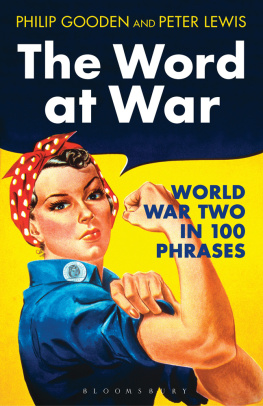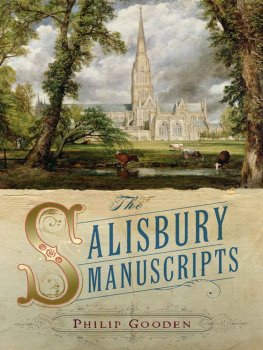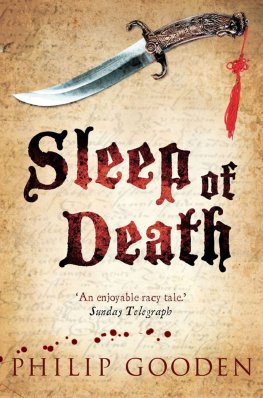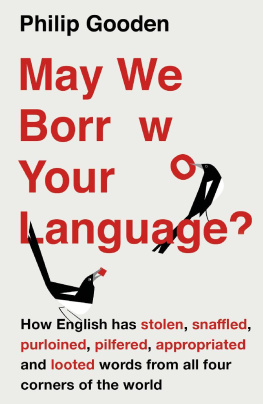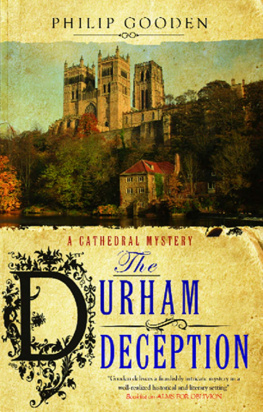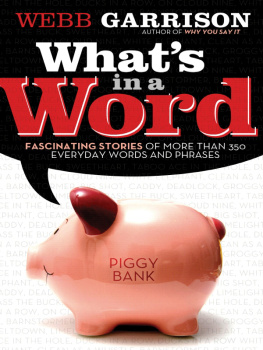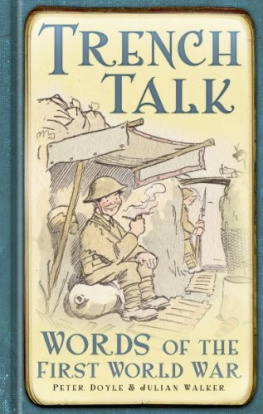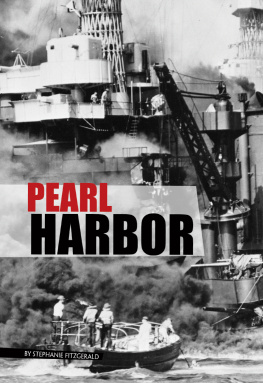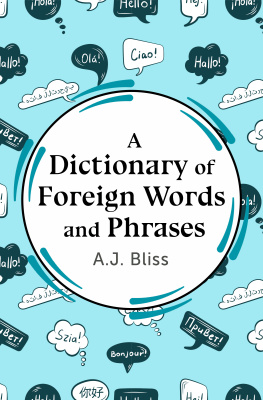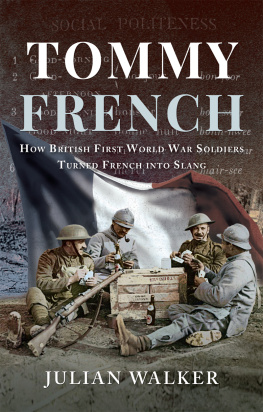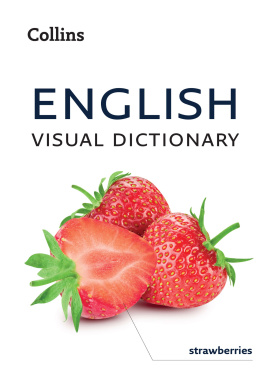Idiomantics: The Weird World of Popular Phrases
Idiomantics is a unique exploration of the world of idiomatic phrases. The very etymology of the word idiom reveals whats so endlessly fascinating about the wide range of colourful phrases we use in everyday speech: their peculiarity. Theyre peculiar both in the sense of being particular or unique to the culture from which they originate, and in the sense of being downright odd.
The ideal gift for word buffs and anyone who enjoys a good yarn, this playful book looks at 12 groups of idioms around the world, looking at subjects such as fun and games, gastronomic delights and the daily grind.
What larks! I take my hat off to them. Theyve got down to the nitty-gritty and delivered the goods. Be amazed be very amazed. And enjoy. I did.
Gyles Brandreth
Non-fiction & memoirs
Noel Annan Changing Enemies (1995)
Mike Brown Wartime Britain (2011)
Michael Burleigh Moral Combat: A History of World War II (2011)
Alan Clark Barbarossa (1965)
Richard Collier 1940: The World in Flames (1979)
Paul Devrient Mein Schler Hitler (1975)
Jonathan Fenby Alliance (2006)
Peter Fleming Invasion 1940 (1957)
Paul Fussell The Great War and Modern Memory (1975)
Wartime (1989)
Doing Battle (1996)
The Boys Crusade (2004)
Daniel Goldhagen Hitlers Willing Executioners: Ordinary Germans and the Holocaus t (1996)
Richard Griffiths Fellow Travellers of the Right (1980)
Max Hastings Finest Years (2009)
Joseph Heller Now And Then (1998)
Robert Hewison Under Siege (1977)
Tom Hopkinson Picture Post 193850 (1970)
Lucy Hughes-Hallett The Pike: G abriele DAnnunzio (2013)
Mark Jacobson: The Lampshade: A Holocaust Detective Story from Buchenwald to New Orleans (2010)
R.V. Jones Most Secret War (1978)
Sidney Kirkpatrick Hitlers Holy Relics (2011)
Victor Klemperer LTI Lingua Tertii Imperii; Notizbuch eines Philologen (1947)
David Kynaston Austerity Britain 194551 (2007)
David Lampe The Last Ditch: Britains Resistance Plans Against the Nazis (2007)
Ben MacIntyre Double Cross (2012)
Robert Mackay Half the Battle (2002)
Leonard Mosley On Borrowed Time (1969)
George Orwell Why I Write (1946)
Nicholas Rankin Churchills Wizards (2008)
Cornelia Schmitz-Berning Vokabular des Nationalsozialismus (1997)
W.G. Sebald Luftkrieg und Literatur (2001)
Studs Terkel The Good War: An Oral History of World War Two (1984)
E.S. Turner The Phoney War (1961)
David Welch Propaganda: Power and Persuasion (2013)
A.E. Wren Oddentification: 64 Drawings and Rhymes reprinted from The Aeroplane (1942)
Fiction
Nigel Balchin Darkness Falls from the Air (1942)
The Small Back Room (1943)
Mine Own Executioner (1945)
Heinrich Bll Und sagte kein einziges Wort (1953)
Das Brot der frhen Jahre (1955)
Irisches Tagebuch (1957)
Elizabeth Bowen The Heat of the Day (1949)
Agatha Christie N or M? (1941)
Len Deighton SS-GB (1978)
Ian Fleming Casino Royale (1953)
Moonraker (1955)
Gnter Grass Die Blechtrommel (1959)
Im Krebsgang (2002)
Graham Greene The Ministry of Fear (1943)
The End of the Affair (1951)
Robert Harris Fatherland (1992)
Joseph Heller Catch 22 (1961)
Hammond Innes Wreckers Must Breathe (1940)
Philip Kerr Berlin Noir (1993)
If the Dead Rise Not (2009)
George Orwell Nineteen Eighty-Four (1949)
David Piper Trial by Battle (1959)
Philip Roth The Plot Against America (2004)
C.J. Sansom Dominion (2012)
Evelyn Waugh Put Out More Flags (1942)
Brideshead Revisited (1945)
Reference
Oxford English Dictionary
Oxford Companion to World War II (2001)
Jonathon Greene Cassell Dictionary of Slang (1998)
J.L. Hunt & A.G. Pringle Service Slang (1943)
Gordon L. Rottman FUBAR: Soldier Slang of World War II (2007)
Online
for Winston Churchills speeches: www.winstonchurchill.org
for Franklin Roosevelts speeches: millercenter.org/president/speeches
for UK pillbox sites: www.pillbox-study-group.org.uk
Chapter
An examination of some of the linguistic terms which were created at the very beginning of the 20th century shows that there were premonitions of the catastrophes to come, verbal tremors of two mighty global conflicts. Whether in areas such as weaponry and the armed forces or espionage and counter-intelligence, or the expansion of warfare to include the civilian population, we find newly created words or new formulations of old ones, each pointing the way towards the new century. It is a century which will outrank the destructive record of any previous period in terms of the sheer numbers of casualties and a worldwide engagement, one from which almost no country will emerge unscathed. And the profound consequences have endured to the present day...
Civilian Collateral
[British: Concentration camps]
For early examples of linguistic innovation in 20th-century warfare, take the decisive impact that Herbert Horatio Kitchener had on the prosecution of the Boer War (18991902). This conflict produced initial defeats for Britain at the hands of two independent statelets occupied by the descendants of the original Dutch settlers of southern Africa. When Britain eventually annexed the Boers territory, widespread guerrilla activity continued only for it to be ruthlessly suppressed by Lord Kitchener, a Commander-in-Chief who was well-versed in other colonial campaigns on the continent.
One of Kitcheners contributions was the creation of the blockhouse system, used to partition the country and so make it easier to control enemy movement. More pernicious was Kitcheners other innovation: the concentration camp (the term first noted in English in 1901). Civilian populations, both Boer and Black African, were forced into these tented camps. The Boer internees were principally women and children expelled from their homes and farms, which were then subjected to a scorched earth policy so as to deprive the male fighters of provisions and shelter. Conditions were very poor, and disease and malnutrition were rife with about a third of the inhabitants dying as a result. That there was an intentionally punitive element in the concentration camp system is shown by the fact that the families of men who were still fighting received even less food than the other occupants.
The link with the Nazi camps or Konzentrationslager is more than nominal, and lies not merely in the indifference or brutality with which the inmates were treated but in the targeting of a specific ethnic group in clearing whole regions. The term ethnic cleansing was not coined until the close of the 20th century but the actions of the British military against the Boer population in southern Africa can accurately be labelled as such. (It is interesting that the term bittereinders, used to describe the Boer fighters who held out against the British until the end, resurfaced after the 2003 invasion of Iraq, when those who continued to resist the US occupation and settlement were referred to as bitter enders or dead-enders.)
The mistreatment of civilians, extending to their deliberate slaughter, is as old as warfare, but the phrase civilian casualty first appears with an almost uncanny aptness at the exact start of the 20th century. Although there was widespread unease and some protest about the British treatment of non-combatant Boers, the term is used not about the war in southern Africa but appears in an American newspaper in connection with the Boxer rebellion in China, the uprising against the presence of imperial powers (Britain, Germany, Russia) on Chinese territory. This first use of civilian casualty ushered in a period which saw war-related deaths occur on an unprecedented scale among the non-combatant populations of warring nations. Estimates are notoriously sketchy but amount to nearly eight million dead for World War One and, when the concentration camp deaths are included, twenty-eight million for World War Two.
Next page
